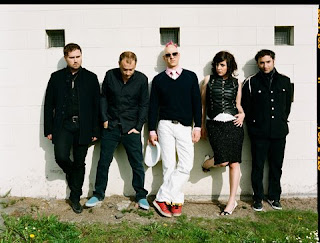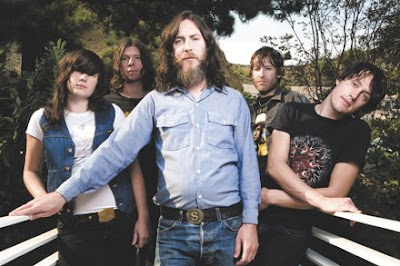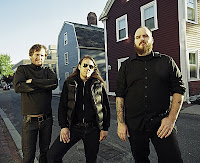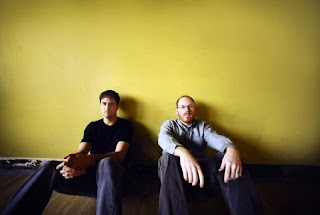LEO: You’ve always been critical in regards to the current state of country music. What exactly do you think is the problem with the way things are?
Shooter Jennings: It’s not that I’m critical, man. It’s just the state that radio is in right now is a very strange place, and it’s not very welcoming to people like me. It’s just come around to a time when the industry has a grip on it, but I believe the artists will have their time again. I kinda feel like it’s not that any of the artists out there aren’t credible – I mean, they’ve all worked. It’s just tougher for guys like me, but I think it’ll come around.
LEO: Who’s to blame for the fact that guys like you who are making real country music are having a hard time breaking into what should be a country music market?
SJ: I don’t know, man. I don’t know who’s to blame. I don’t know if we should just point the finger at the industry – it is what it is. They all operate on a self-maintaining system. Most of the time artists like us, that are always tried and true, we have work and breakthrough ourselves, because they never come looking this stuff.
LEO: Is there anything worth salvaging on mainstream radio – do you pull out Kenny Chesney or Tim McGraw albums?
SJ: I like Brad Paisley a lot … I always have. I like the songs he writes, I love his guitar playing. I love Alan Jackson, I still buy his records. There’s a lot of different people that are good, and there’s a lot of diamonds in all of that coal. It’s few and far between, because it’s all built on relationships between labels, producers and songwriters; they all scratch each other’s backs; that’s just how it is. I guess all the genres are in a bad place, it’s not really just country. Rock is in a really bad state – the only thing that’s thriving is hip-hop, and that’s pretty hard to break through … at least from what I hear.
LEO: No Shooter Jennings rap album coming up then?
SJ: No. (chuckles) No, I don’t think so. I did, however, toy with the idea of getting Chuck D. to be on the next record, because I love Public Enemy. I’m kinda thinking something like that would be really cool.
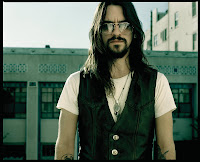
LEO: So why do you still play country music?
SJ: They don’t say they like me – but they accept me and my existence. I put out a record not knowing where it was going to land, and it landed in country. I play music that is influenced from all over the place. But country is a huge influence – there’s a lot of country on our records. I feel like The Wolf is a really country record, but I paint with really broad strokes and draw off all of them – I don’t try to categorize it.
But that didn’t really answer your question.
It’s like, they know I’m country. When I walk into a room full of rockers, I’m just another country guy, ya know what I mean? Even though I’m as rock as a lot them – they just see what I do as country no matter how I hard I try to make it anything else.
My influences aren’t old classics. I mean, I listen to new stuff, like I keep up with new bands that are cool. Like the Raconteurs record (Consolers for the Lonely) that came out the other day is like my favorite record – I’m so flipped out and so excited over it. It’s given me all kinds of hope hearing that record. Because it’s one of the best records we’ve heard in years, and it’s the best sounding record, too. Dude, I mean when you hear it, you’re going to lose your shit, it’s so good. It’s worth every fuckin’ penny – I got it at midnight the day it came out.
LEO: You sing a lot about your father on all of your records. Musically how much of him is in what you do?
SJ: A lot. I mean, a lot of him is in me, period. I was very close to him, and he had a relationship with music that I loved and admired; and I feel like I had a lot of years with him while I was making music. But there are certain things that are very home to me when I hear his music. His music was so on the edge at the time – that’s what sounded so cool – there was nothing about it that was cheesy or produced or anything. It was just hardcore cool, mixing rock and country. Hank Jr., too, he did the same kind of thing. Taking Rock and Country for the first time putting that association together – I just felt like that was really … important.
LEO: How has becoming a father yourself affected your music?
SJ: Oh, a lot. I’m already pretty deep in the new record, and there’s definitely a lot of stuff about her and how she changed my life or whatever. But at the same time I’m seeing the world differently now, in this weird way. I don’t know how to explain it but I see it differently. It’s kind of mimicking her face in a way but it’s also like she’s a blank slate and this is the world she’s seeing. So I kind of view myself a little differently, I view my life a little differently, and it just really set me on straight as to what my purpose is here and the importance of staying true by what I do.
LEO: Do you think you’re the bearer of the torch lit by Waylon, Willie and the boys?
SJ: I don’t know if I would say that about myself. I’m just doing exactly what I want to do and I’m very excited and continuing to make more music. I feel like we’re just hitting our stride and this is as close to my personality as you can get.
LEO: Is it difficult to write a country song among the hipsters and daily hustle that comes with living in New York City?
SJ: (Big laugh) I’m only there part of the time, and it’s actually just as dirty as any ol’ town. Really, I’m holed up in our apartment most of the time when I’m there – I’ve usually just got a beer and a guitar. But it’s a great town.
I love living in L.A. too – I’m back and fourth between the two places – I love L.A. for the scenery, for how open it is, the weather, and all of that stuff. But there are things in New York that you just can’t get anywhere else. And I’ve always been somebody who wants to experience it all, so I think I’ve kind of set my life up that way, to some degree – to be right in the thick of it. I don’t like being isolated somewhere; it makes me feel like I’m bitching out on something.
LEO: On the new album you cover Mark Knopler’s “Walk of Life. That’s unexpected to say the least. Why that particular song?
SJ: Partially because it was out of the blue. I thought it was a cool idea to do something like that, because we hadn’t really done any covers except for a Hank Jr. song for iTunes. It was just sitting there playing one day and I was like: “Oh, what if we did this song?” Just because it was on, that’s why I liked the idea so much. But then I fell in love with the song in a totally different way once I understood kinda what it was about. I just felt like we could make a real thumping, honky-tonk kind of thing with it
LEO: The Wolf seems to be a metaphor on this album. What does it mean to you?
SJ: A lot of making this record was me accepting myself as an outsider to some degree. I had a lot of issues going on in my life, and I was basically just sorting them out on record. The Wolf is kind of an analogy for feeling like a wolf in a pack of dogs – like the Ugly Duckling. But Ugly Duckling would have been a lot less tough of a name for the album.
But I kinda came to terms with all of that during the process of making the record. Then went out and made something really raw and really country … I was just feeling it. I really wanted to cut a solid exploration into all of the influences and really make the country as authentic and cool and real and heartfelt as possible.
LEO: “Tangled Up Roses” is one of the best country songs I’ve heard in years…
SJ: Thanks man, I really appreciate that. I wanted that as the single but the label said “This Ol’ Wheel” is goin’ — so I was like, alright, we’ll see what happens.
LEO: … Well obviously the song is about a passionate however, tumultuous relationship …
SJ: Yeah, I had a lot of friends jammed into these kinds of situations, and I felt like they could relate to it. Because it’s very true, that’s how my relationship has been, but at the same time, there’s nothing else like it.
LEO: … So how does Drea (De Matteo, The Sopranos star and Jennings’ longtime girlfriend) take to hearing a song like that? Is she embarrassed to have your dirty laundry aired out in that way?
SJ: Nah, she’s like, “That song’s gay!” (laughs). She’s like, “I wanna hear ‘This Ol’ Wheel’” or whatever. She’s funny like that. I love her. The dirty laundry doesn’t matter to her. She doesn’t give a shit, she just laughs it off.
LEO: How autobiographical is a song like “This Ol’ Wheel”?
SJ: Oh, absolutely 100 Percent. It’s three very big phases in my life where I was up against major conflict and feeling like I had to start over and keep pressing on. All three verses are very specific as to what was going on in my life. It’s kind of a song about perseverance.
LEO: Who was “Old Friend” written about?
SJ: Yeah, it’s a tribute to all of my old friends. But there’s a guy I’ve known since I was about 8 years old named Matt Reeser, and he’s been my best friend. We started my first band together, or one of ’em, which he ended up movin’ and wasn’t there the whole time; but he formed other bands. We used to live together, too. But now he lives in Nashville, so when ever I’m in town I roll through there. So I wrote that song to show my appreciation for him being a friend to me.
LEO: How come there was not a “Manifesto No. 3” on The Wolf?
SJ: (He laughs) I guess you’ll just have to wait on that one. It has to be right when I get ’em, that they deserve the title.
LEO: “Manifesto No. 1” was probably my favorite track on the first record …
SJ: Thanks, man. I thought that should have been another single, too. But the label was like: “Movin’ on …”
LEO: Was it a little too blunt for them?
SJ: It wasn’t even that. They wanted to do “Steady at the Wheel,” which I was happy about because it was Ted (Kamp, bassist for The .357’s)’s song, and it did well. I mean, it tested well in Texas and stuff, but I thought they should have taken a chance with “Manifesto.”
LEO: When performing a highly personal song like “It Ain’t Easy” in concert, is your mind there with the audience or do you tend to get drawn back into the emotion from which the song sprang in the first place?
SJ: Well, it depends on how we’re playing it that night. If we’re killing it, I get really into it like that, emotionally. But if I’m worried that I’m screwin’ it up or something, then I just have to get through the best I can. I do sometimes get in that rush and get lost; but it’s hard to do that a lot when there’s a lot of people and a lot of noise, but sometimes is does happen. With “Sweet Savannah” though, whenever we do that one live, I always kind of go away.
LEO: What’s next for Shooter Jennings?
SJ: Well, I’m probably going to get in the studio toward the end of the summer; that’s my guess. I’m just starting it, and I’ve got a lot of it done, I’ve got the concept down; I’ve even got the artwork done for it, believe it or not. I’ve kinda got the whole thing down; it’s just going in there, finishing it, and living a little … living through some more songs, ya’ know? Basically, get that sucker done and put out.
Shooter Jennings, Eddie Spaghetti from the Supersuckers and El Roostars play Thursday at Headliners Music Hall. Tickets are $15. Doors open at 8 p.m.
Contact the writer at leo@leoweekly.com
